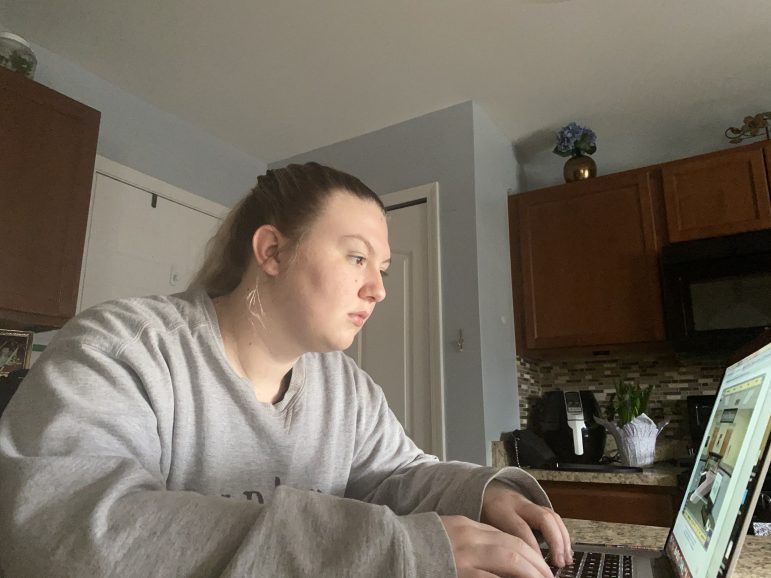Shannon Sexton is finishing up her fourth semester in Saginaw Valley State University’s five-semester nursing program. She plans to graduate with a Bachelor of Science degree in nursing in December, which means her clinical rotation and hands-on experience have shifted to virtual environments that are a less desirable learning experience.
Sexton said students at SVSU aren’t allowed to assist in hospitals.
“The lack of hands-on education is frustrating, especially since I’m so close to graduation,” she said via email.
Her internship over the summer working on-on-one with a nurse in a hospital is now an online simulation.
The nursing program at SVSU admits up to 96 students per semester.
While nurses set to graduate in May find themselves entering the workforce earlier because of an increase in healthcare needs, nurses who are only a semester or two behind find themselves left with inadequate training.
Brandy Justin’s classes and clinicals at Henry Ford College have also moved online, where she plans to receive her Associates of Science nursing degree.
“I don’t feel as confident learning this way,” she said via email. “We are still practicing all of the recommendations per the program, but not actually being there seems to take away the experience.”
Justin also works as a nursing assistant in a COVID-19 intensive care unit at Henry Ford Hospital in Wyandotte, Michigan. She said for those who aren’t working in healthcare, not having hands-on work is taking away from their clinical experience.
Henry Ford Wyandotte Hospital in Wyandotte, Michigan.
Chelsea McDowell is another student affected by the switch to online classes. She is finishing Wayne County Community College’s two-year nursing program and plans to graduate with an Associate’s degree in December.

McDowell completes an online exercise for the nursing program.
Though classes moved online, she still gets hands-on experience working as a part-time nursing assistant in the intensive care unit at Wyandotte’s Henry Ford Hospital.
“I was supposed to be done with the semester at the beginning of May,” she said via email. “The rest of my classes have been delayed until Apr. 17.”
While she is frustrated at the transition to virtual learning, she said it is best for everyone’s safety.
“It’s physically and emotionally exhausting,” she said. “The virus impacts everyone, the elderly and the young, so moving classes online is overall beneficial.

Zachary Stempien, a nursing assistant and student at the University of Detroit Mercy, is dealing with the transition to online classes and expects to graduate in May.
He said there was a lot of uncertainty with this transition.
“All of our clinical rotations were canceled,” he said via email. “It left us wondering if we would meet the state requirements for the program, or if we would get to graduate and take our board examinations.”
Stempien said he believes some students should still be able to assist in the field, since many of them are so close to graduation.
“We have the tools we need to begin working in the nursing field,” he said. “We’re ready to be in the workforce fighting this pandemic, and it seems like our help is needed.”
Even seasoned nurses feel overwhelmed
Margaret Glidden, a registered nurse at Henry Ford Wyandotte Hospital, said via email, she believes the best way to truly understand nursing and patient practice requires immersion and hands-on participation, such as classroom practical and clinical rotations.
However, she said that there are a lot of questions to be asked when it comes to students assisting in the field.
“A poorly trained student can kill someone,” she said. “Patients need us to be on top of our game during this pandemic.”

Glidden said the ICU is beyond challenging for even the most seasoned nurses.
Angela Rosamilla is a travel nurse in a contract with Brigham and Women’s Hospital in Boston, Massachusetts. She graduated from the University of Rhode Island’s nursing program in 2014.
Brigham and Women’s Hospital in Boston, Massachusetts
“I understand the need to switch to online classes to prevent the spread of the virus,” she said via email. “But hands-on training is critical to learning how to assess and treat patients.”
She also said it is a nerve-wracking time to be a nurse, because of rapidly changing guidelines, equipment shortages and the fear of becoming ill.
“I’m part of a float pool and am pulled to work wherever needed,” she said. “The past few weeks, I’ve been assigned to a COVID-19 unit every single shift.”
She said it felt like she had been thrown into a war zone the first night she worked in that unit.
“I have never been so anxious to go into work,” she said. “I never imagined dealing with this feeling of dread in my career.”
Rosamilla said the pandemic has taken their job as healthcare workers and turned it completely upside-down.

